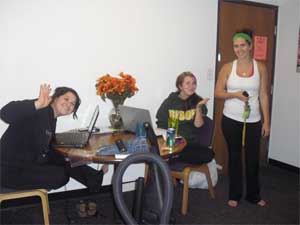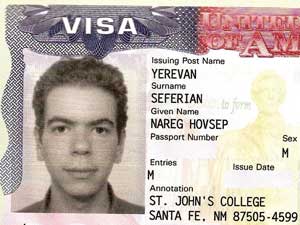This year is my second year at Mount Holyoke College and my third year in the States. Yet even after so much time here, there are still moments when I realize how culturally different Americans are, and I feel like screaming, “I don’t belong here!”
I contacted my friend Dmitry, who is finishing his third semester as a Fulbright Fellow at Iowa State University, to ask him how he was feeling about American academics so far.
We both went to university in the same city in Russia, so I thought it would be fun to compare notes. As it turned out, we didn’t always agree on how the American style of education is different from what we’d experienced before, or why.

Here’s our conversation on:
- Classroom behavior
- The relationship with professors
- Personal conversations
- Homework and grading
(click to jump to that section)
Anna: I will never forget when in my first year in the U.S. a girl sat next to me in the front row of a morning class and, as the professor was speaking, put her breakfast on the table and started eating. First, she peeled an egg. Then she spread jam on her toast slowly. I thought to myself: “Oh my god, I hope the professor won’t notice!”
It felt so awkward to me and all I wanted at that moment was for the professor not to notice her eating. Later I learned that in an American classroom eating and drinking are totally acceptable and it doesn’t upset me anymore when I see Mount Holyoke students eating their breakfast or lunch in class.
In one of my classes at my Russian university I felt thirsty and went to get a drink. I wasn’t even going to drink it in class; I just put it on my table. However, when the professor noticed that, she paused to scold me. Yes, right in the middle of her lesson!







 And before he knew what was happening, he found himself being secured by two policemen, hands behind his back.
And before he knew what was happening, he found himself being secured by two policemen, hands behind his back. I come from a close-knit family, and perhaps especially because I am currently away from them, I’ve found real beauty in the togetherness and fellowship that forms a big part of the Thanksgiving holiday.
I come from a close-knit family, and perhaps especially because I am currently away from them, I’ve found real beauty in the togetherness and fellowship that forms a big part of the Thanksgiving holiday.

 Shree Raj Shrestha
Shree Raj Shrestha First Steps: What to Do if You Want to Study in the US
First Steps: What to Do if You Want to Study in the US What Does it Mean to "Be American" as a Chinese Student?
What Does it Mean to "Be American" as a Chinese Student? The Truth: Americans Reveal What They Really Think of International Students
The Truth: Americans Reveal What They Really Think of International Students Take a Tour Around my Typical American Dorm Room
Take a Tour Around my Typical American Dorm Room Staying Safe: A Story No One Should Have to Tell
Staying Safe: A Story No One Should Have to Tell What Americans Think When They Hear Common English Mistakes
What Americans Think When They Hear Common English Mistakes How to Speak English Fluently?
How to Speak English Fluently? Why You Will Gain 10 Pounds in America (and How to Lose it Again)
Why You Will Gain 10 Pounds in America (and How to Lose it Again) Don't Study in the US: A Look at the Pros and Cons
Don't Study in the US: A Look at the Pros and Cons 5 Stories That Might Change How You See the World
5 Stories That Might Change How You See the World Student Visa Tips From Visa Officers
Student Visa Tips From Visa Officers